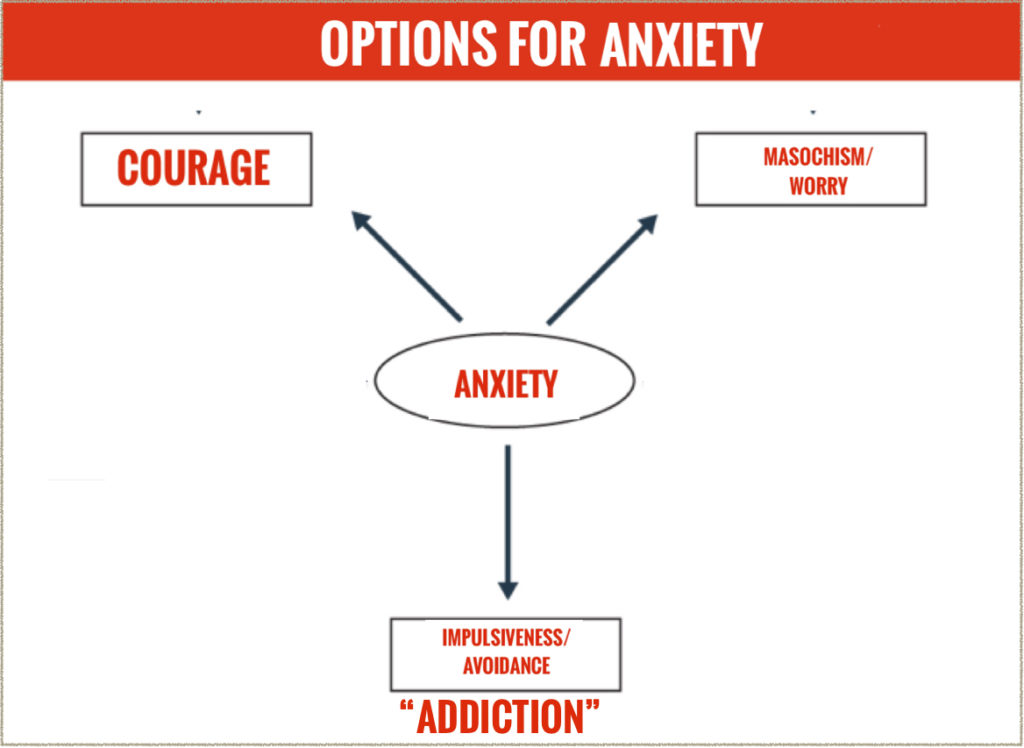Addiction is a passive response to anxiety, seen in detail on the Anxiety Map, in which one seeks avoidance of a threat (by hiding inside from it), or impulsively striking out at the threat without thinking it through, which has been called, "aggression," which is a cross-over point (via the Reptilian Brain) to the Anger Map. As such, addiction, impulsivity and avoidance are forms of anxiety, in which one is passive with this negative energy of anxiety. Someone who is fearful, might either run away from a threat, or might mindlessly struggle or attack the threat. You may recognize this as a reptilian-brained instinct of survival, called the "Fight or Flight Instinct." It is the likely operating principle behind what many people suffer of, called, "panic attacks."
In terms of the diagrams of the "three brains" in Romantic Dynamics, addiction, impulsiveness or avoidance, are at the bottom of the Anxiety Map, where one is passive, and doesn't make a decision as to how to use anxiety. The anxiety in addiction may have originated in grief or loss, emotionally, or it may have originated in being cut down or depleted in the self-esteem called, "confidence." The unique thing about anxiety is that, unlike anger, when we are passive with it, it likes to automatically drive us to thoughtless actions rather than just remaining still in our bodies and minds. This is why it is the "passive option" - the down-arrow of the Anxiety Map. Because it is reactionary and impulsive, and thoughtless action, it is a "Reptilian-brained" mode of using anxiety.
If you have ever "turtled" or stuck your head in the ground like an Ostrich, or know someone who has, consider whether they have "a lack of confidence," which is the very thing that loss, threats and the anxiety they produce, take away. All the threats and losses in life are the source of the anxiety, which causes us to engage in the survival reflex to hide from them. Normally, this "fight or flight reflex" is designed to save our lives, not harm us, but the key rests in whether a threat or loss out there really is deadly or not. So many things in the modern world - divorce, bankruptcy, illness, and other stresses may really feel to us like they very well may kill us, but they really can't. And so, the reflex that is designed to save our lives, if misappropriated or misconstrued as used in facing a deadly threat, ironically, may actually kill us through addiction. Courage is the cure for it.
For example, if one is "fearful about a job," then what are the details?
They may say they are fearful about the "mean boss," the "low pay" that may threaten their ability to pay the bills, and the "high hours" that may threaten to cause them illness and lack of sleep. However, if they were to get angry instead of addicted, they'd be angry about the mean boss, the low pay and the high hours. If they could channel this into directly confronting the fears, through courage, they may be mobilized them out of addictive passiveness and prepared to face the truth about how terrible the job really is. We know for a fact that leaving the job can't kill them. It can only make them more confident and stronger, through courage.
Courage, is of course, the way out of addiction and anxiety, because it amounts to going out to face one's fears, without hurting others through guilt. Courage and the confidence it builds, are the prime goal of the Anxiety Map.
The down-arrow on the Anxiety Map means that one is emotionally passive, and so passivity and inaction also branch over to the Anger Map, and cause depression to deepen. Masochism is at least, emotionally active (although it solves the problem by dumping anxiety onto others through guilt or neediness.)
By this guideline, then, either masochism or courage are better than staying in addiction. At least masochism teaches one the decision-making lessons that come with destructiveness, "win/lose" behavior, and feeds the stores of both ethics (conscience) and shrewdness (intuition), for better, more courageous decisions with anxiety in the future.


